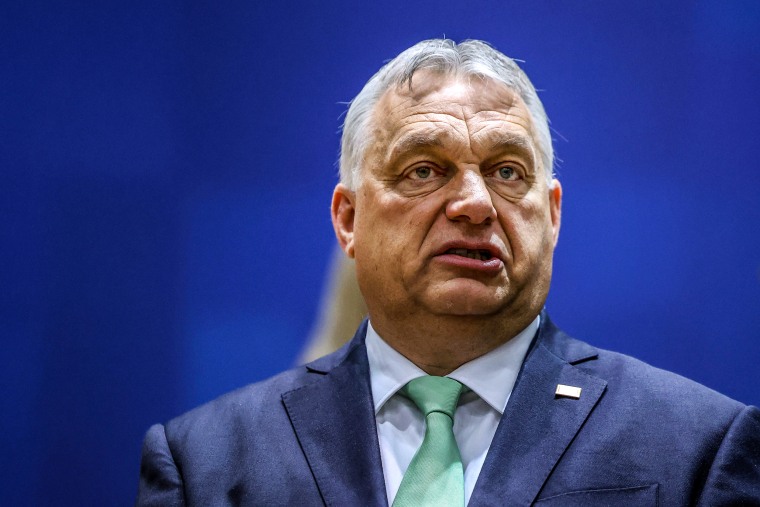Hungarian Prime Minister Viktor Orbán called the U.S. a main adversary of his right-wing political party during a meeting with associates, a move that could lead to more friction between Washington and Budapest, according to a CIA assessment in a U.S. document that was among those recently leaked and posted online.
Orbán allegedly made the comment during a Feb. 22 “political strategy session,” the leaked document said, citing the U.S. Embassy in Budapest. The CIA said the inclusion of the U.S. in Orbán’s “list of top three adversaries constitutes an escalation of the level of anti-American rhetoric in his discourse,” according to the document.
Relations between the U.S. and Hungary, a NATO member, are already tense because of Orbán’s strengthening ties with Russia and China.
The Hungarian Foreign Ministry and the U.S. Embassy in Budapest did not respond to requests for comment. The CIA, the National Security Agency and the Office of the Director of National Intelligence have declined to comment on any of the intelligence reporting described in the leaked documents.
The Wall Street Journal was first to report on the leaked document that revealed Orbán’s alleged move to characterize the U.S. as an adversary.
The item is among dozens of documents NBC News obtained after an apparent Pentagon leak that is currently under investigation by the Defense and Justice departments. The dozens of pages that were posted online seem “to contain sensitive and highly classified material,” though some may have been altered, Pentagon spokesperson Chris Meagher said Monday.
The U.S. and Hungary have enjoyed close ties since the end of the Cold War. But under Orbán, Hungary slowed Finland’s admission to NATO and continues to hold up Sweden’s entry. Hungary is also a member of the European Union, but as the rest of Europe has cut its consumption of Russian oil, Hungary has lobbied the E.U. to abstain from this effort.
The E.U. declared in a parliamentary resolution last year that Hungary had become “a hybrid regime of electoral autocracy” under Orbán and criticized him for promoting anti-democratic values.
President Joe Biden appointed David Pressman, a human rights lawyer who is gay, to serve as U.S. ambassador to Hungary, despite the strong anti-LGBTQ+ stance of Orbán’s nationalist party.
Pressman, who has become a target of the Hungarian media and Orbán’s government, has not shrunk from criticizing growing anti-American sentiment in Hungary. The embassy posted a video quiz to Twitter that asked people to guess whether quotes came from Orbán and his supporters or from Putin. (Putin was never a correct answer.)
A central issue between the U.S. and Hungary is the war in Ukraine, where Hungary has struck an ambivalent stance. While condemning the invasion, Orbán and his government have refused to criticize Russian President Vladimir Putin. They have also called for an immediate ceasefire.
Orbán’s chief of staff, Gergely Gulyas, accused the U.S. embassy on Wednesday of whipping up public support to change the government’s position on Ukraine and Russia, according to a series of posts tweeted by Hungary spokesperson Zoltan Kovacs.
Gulyas said that the U.S. "has not given up trying to squeeze HU [Hungary] into the pro-war position shared by many of our allies, but HU remains convinced that peace is the only common interest,” according to the string of tweets.
“There is no alliance, diplomatic or even friendly pressure that Hungary will not resist,” he added.
Orbán considers himself to be more aligned with former President Donald Trump and the Republican Party, which Hungarian officials have openly discussed in interviews. Orbán even recently tweeted his support for Trump in the 2024 presidential election.
Hungary’s ties with China and Russia have continued to grow. Foreign Minister Peter Szijjarto traveled to Moscow this week to hammer out a new deal with the Russian-controlled oil company Gazprom, announcing an agreement on Tuesday. Szijjarto has also shared that China was Hungary’s largest investor in 2022, though he did not provide specific data about financial dealings.
The U.S. Treasury Department announced new sanctions on Wednesday that could affect Hungary. The agency said it had targeted International Investment Bank, a Russia-controlled financial institution in Budapest.
The bank’s “presence in Budapest enables Russia to increase its intelligence presence in Europe, opens the door for the Kremlin’s malign influence activities in Central Europe and the Western Balkans, and could serve as a mechanism for corruption and illicit finance, including sanctions violations,” the Treasury Department said in a statement that also noted it would be sanctioning Hungarian national Imre Laszlocki, a deputy chairman on the bank's board.
Slovakia, Romania, Bulgaria and the Czech Republic all ended their ties to the International Investment Bank after Russia invaded Ukraine in February 2022, the Treasury statement said.
Pressman discussed the sanctions at a news conference Wednesday at the embassy in Budapest, according to Reuters. The ambassador emphasized that Hungary was a close ally but said the U.S. is "concerned about Hungarian leaders seeking ever closer ties with Russia."
“With this announcement," he said, "the United States is demonstrating that we will take action in response to Hungary’s choices and to curb the access of Russia and sanctioned Russian persons to the international financial system.”

